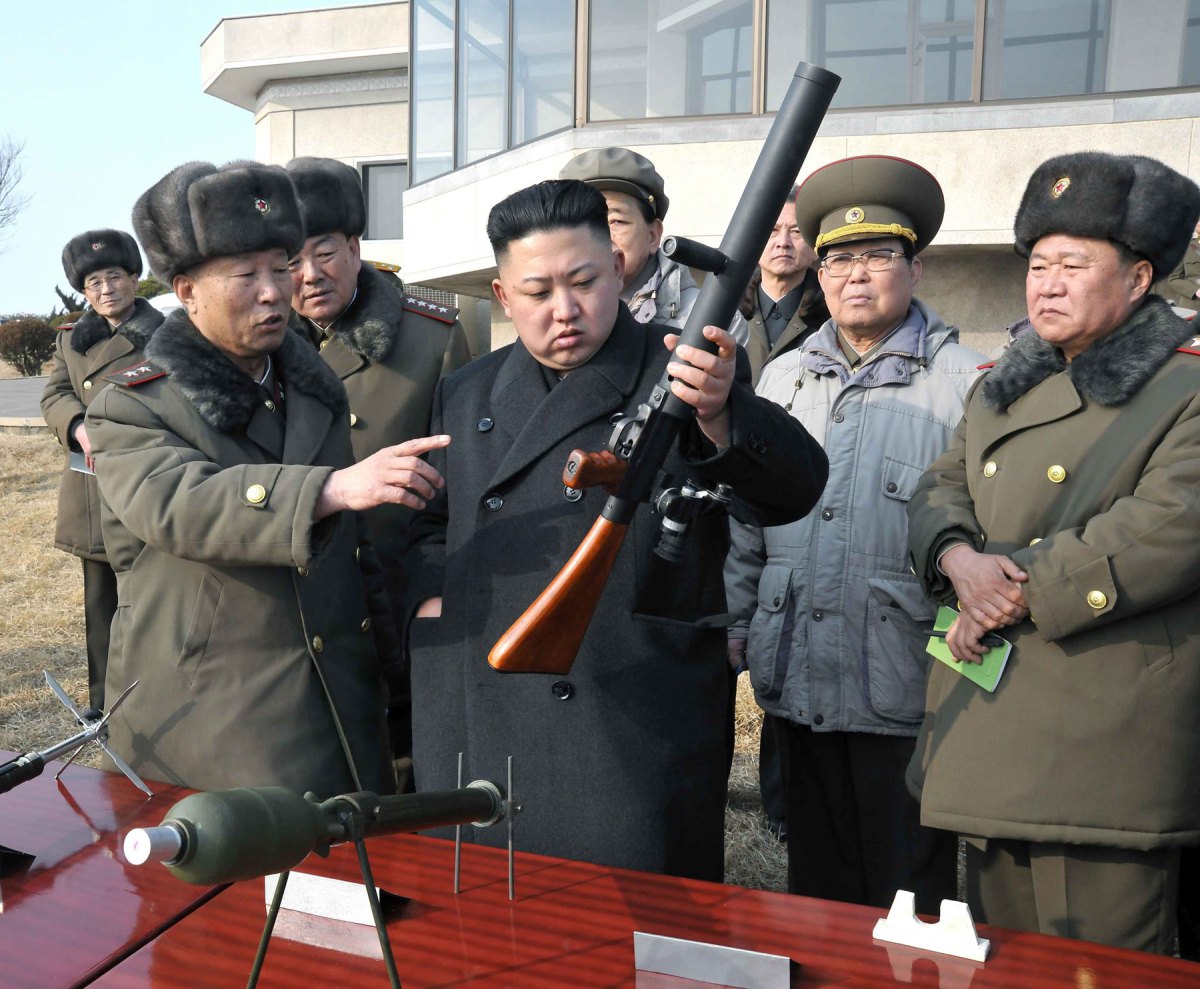 Over the last week, the U.S. media have been filled with lurid accounts of a “coup” in North Korea and predictions of either a revolution from within or a coming collapse of the country. In this piece, I look first at the rumor-mill and then consider the views of a colleague who has been in Asia for decades and works for an organization with extensive contacts in North Korea (not the CIA!)
Over the last week, the U.S. media have been filled with lurid accounts of a “coup” in North Korea and predictions of either a revolution from within or a coming collapse of the country. In this piece, I look first at the rumor-mill and then consider the views of a colleague who has been in Asia for decades and works for an organization with extensive contacts in North Korea (not the CIA!)
Like so much reported on North Korea, which many people forget was bombed into smithereens by the U.S. Air Force during the Korean War, the latest reports of a power struggle are as thin as gruel and lack even a modicum of skepticism or doubt.
Essentially, the logic of the speculation goes as follows: Kim Jong Un, North Korea’s 30-something hereditary dictator, has not been seen in public for something like 30 days and may be ill, possibly with gout; last weekend, a high-level delegation from the North came to South Korea led by a senior general and reached agreement on new talks with South Korea; some defectors say Kim is not in control; ergo, there’s been a coup!
Nobody seemed to pay any attention to the fact that reports of coups and assassinations in the North have been a staple of U.S. media propaganda for years, dating back almost to the country’s founding in 1948. Here’s two examples I found in a cursory search on NEXIS, and posted last week on Twitter:
- Kim Jong Il’s assassination fears.” UPI, Nov. 10, 2009 (The Junior Kim died in 2011 of a heart attack. No assassination.)
- “South Korea Says North’s President Dead Or Power Struggle Under Way.” AP, 1986 (The Great Leader died of a heart attack in 1994. No power struggle.)
One of the most irresponsible stories of the week was in VICE News, which published a sensationalist account on October 2 based on a single source, “Jang Jin-sung, formerly a key member of Kim Jong-il’s propaganda machine,” who is in exile in Europe. “Former Top Official Says Kim Jong-un Is No Longer in Control of North Korea,” the headline darkly proclaimed. Not to be outdone, the Daily Beast followed up a few days later with this headline: “Has North Korea’s Kim Jong Un Been Toppled?” The story included a few comments to the contrary, but was based heavily on the mysterious Mr. Jang.
As Business Insider commented in its round-up of the rumors: the claim made by Jang “has no outside confirmation.” That can be said of 99.9 percent of the latest reports.
(NOTE: I’ll have more on Jang tomorrow from a source who has worked with him. His claims were made September 18 at a conference at the University of Leiden in Holland, and followed the closed-door rules of Chatham House, the reknowned British foreign policy think-tank. The Vice reporter apparently did not attend the Leiden conference, but “confirmed” the gist of Jang’s comments later on the phone).
Lately, some outlets have tried to provide some actual reporting from Korea. In an excellent story today, the Guardian stated that “claims that Kim has been toppled are not supported by reports of internal North Korean lectures explaining the surprise visit” of its top general to the pro-U.S. South. And Bloomberg, in a dispatch today from Seoul, tried to add some caution:
The constant rumors are “a real headache” for intelligence agents, said [an academic analyst at] Hanzhong University. He cited a rumor last month that a coup led by North Korean military officer Jo Myong Rok toppled Kim. Jo has been dead since 2010.
Bloomberg went on to say:
Kim is “somewhere in the north of Pyongyang,” South Korean Defense Minister Han Min Koo told lawmakers on Oct. 7, citing “reliable information” from the intelligence unit of his ministry, according to footage from Yonhap TV. Han said his military was mobilizing all its intelligence assets. Yonhap said his comments support the view Kim is staying at a family mansion in the county of Kangdong. That estate has a 1,600-meter-long horse track and is one of a number of exclusive resorts used by the family, a former chef for the Kim family who goes by the pen name Kenji Fujimoto said in a 2003 memoir.
“For now, you can say what you want about Kim Jong Un and it’s hard to disprove some conspiracy theories until he reappears,” John Delury, a professor of international studies at Seoul’s Yonsei University, said by phone. “It’s a real soup of bad information, disinformation, paid-for information, and it’s hard to call anyone’s bluff.”
Well, the same could be said of the U.S. press. As I’ve been writing for years, when it comes to North Korea, the media believes almost anything. Here’s the bottom line:
1) Don’t believe what you read in both the mainstream and web-based U.S. press.
2) Nobody really knows what’s happening inside the DPRK.
3) Some changes may be underway and, if so, we may know something soon.
I reached those conclusions last night in an email discussion with a friend and colleague who’s been following events in North Korea closely since the tumultuous years of the Reagan administration. He’s a retired U.S. military officer with decades of experience in East Asia, including in China, and works with an organization that, as I mentioned earlier, has experience in North Korea and is also well-known to the U.S. government.
His dispatch (below) is based on his own conversations in recent days with people knowledgeable about both Koreas, including a few I’ve worked with over the years on research and reporting projects. Basically, my writer says, look for any answers in what happens at the end of this week, when Pyongyang celebrates the birthday of its ruling Workers Party: If Kim is missing, then something quite extraordinary could be happening. But probably not along any of the lines our U.S. media experts have predicted.
The analysis herein is very much worth reading, and will hopefully show U.S. reporters and editors that, when it comes to Korea, actual reporting is what’s needed – not mindless speculation. He begins by listing reasons to think that North Korea – AKA the DPRK – is operating as usual, then lists some factors that may indicate that some changes may be underway, including the possibility of a government where the Kim family shares power with the ruling military and technocratic elite and the personality cult is either de-emphasized or used by the ruling circles for their own ends. He doesn’t seem to think an actual coup is in the works.
WHAT’S REALLY HAPPENING IN NORTH KOREA?
Factors arguing DPRK is firmly under control:
— When there’s a big problem, DPRK often shuts almost all channels except for one so that DPRK completely controls what information flows to the outside, when and how. They are actually reaching out to many audiences
— Several high level DPRK delegations travelled abroad recently. It’s nearly impossible for that number of folks to travel to that many places if no one’s in control or if there is an extreme degree of palace intrigue. DPRK sent high-level (Minister and above) to US, UN, Europe, ASEAN, Southeast Asia, Mongolia, and most recently South Korea. DPRK’s Ambassador at the UN, UK and in Vienna have been reaching out, giving interviews and even acknowledging the obvious – that North Korea has political prison camps. The breadth of activities point to some coherent, collective consciousness back in Pyongyang.
— Hwang Pyong-so delegation (Hwang Pyong-so, Choe Ryong-hae and Kim Yang-gon) delegation to ROK went in Kim Jong-un’s plane. Whether or not Kim maintains a nuclear command and control suite on the aircraft, there would have to be a conscious highest-level decision to agree to let South Korea (and others) know that kind of information.
— DPRK openly said Kim Jong-un was healthy. Normally, when DPRK officials or even rank and file are asked about the Supreme Leader’s health, they respond that asking after the Young Marshal’s health is an insult to the dignity of North Korea’s leadership. DPRK is often accused of lying, but this is a case where they appear to have offered a straight forward answer.
— There do not seem to be any indications of troop movements or military alerts. If there were internal dissension, we would likely see something ranging from KPA movement to mobilization and increased border security. None of those seem to have happened.
Factors arguing that DPRK is firmly under control, just not under Kim Jong-un’s control:
— Kim Jong-il had almost 30 years to consolidate his rule over OGD [Note: that’s the Organization and Guidance Department of the Korean Workers’ Party]. He endowed OGD with the ability to surveille members of the Workers Party of Korea. Kim Jong-il likely did not finish transferring control of OGD to Kim Jong-un. Kim Jong-un’s natural allies are Swiss classmates, not folks who have survived decades of trench warfare and internecine DPRK domestic conflict.
— Kim Jong-un has not been seen in over 30 days. DPRK’s Supreme Leader has disappeared in past, but usually during times when U.S. was bombing places in Mid East or raising tensions in Asia. DPRK often releases undated photos. They could have released an undated photo or a waist up photo if the people really needed to be reassured that the Young Marshal was fine.
— Kim Jong-un missed a Parliamentary meeting. Even though the meeting have a pro forma feeling it is important to show up in order to convey his personal imprimatur. IF Kim misses the 10 October anniversary founding of the Party, the situations should be closely watched – it is a more serious indicator that something has changed in the top leadership.
— While in ROK, DPRK’s Vice chair of the National Defense Commission (North Korea’s Supreme Organ of National Power akin to China’s Politburo Standing Committee) only mentioned Kim Jong-un in passing. If half-hearted clapping is a capital offense, slighting the Supreme Leader by failing to praise him in a foreign land is probably at least as serious.
— DPRK press is also not too bothered that Kim Jong-un has been missing. DPRK press doesn’t make the decisions about what to show, but because of DPRK extensive surveillance network (1 informer per 20 households from MSS Ministry of State Security and 1 informer per 20 households from MPS Ministry of Public Security) they know when the people are getting antsy at not seeing Kim Jong-un and when the people are satisfied by not seeing Kim Jong-un. There have been subtle signs of “adaptive discourse” or the press altering coverage in response to what the people perceive. We’ve also seen increasing coverage of his sister, Kim Yeo-jong. DPRK press only professes loyalty to the Baekdu bloodline – to which she belongs.
— DPRK has NEVER sent such a high-level delegation to South Korea. Arguably when Jang Song-taek went in 2002, he was # 2 in actual power. Although Jang Song-taek’s official position at that time ranked in the double digits, so it is an imperfect comparison.
— DPRK went from denigrating ROK President Park on a personal basis, saying South Korea can’t be dialogued with, to talking with her staff. Granted some of change is due to statecraft, swallowing hard and then shaking hands, but still it indicates Kim’s word is not final.

